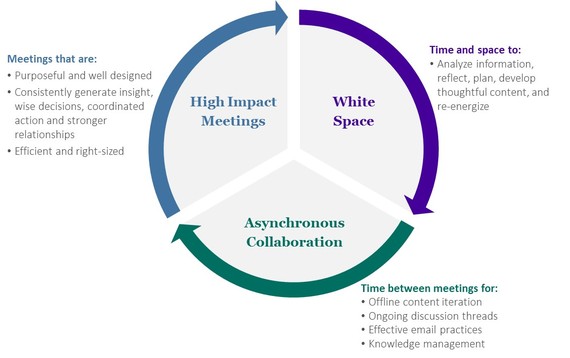
It's 4:00 a.m. in California, 8:00 p.m. in Tokyo. You're logged into a conference call in your pajamas hunched over a cup of coffee trying to stay focused on the topic of the discussion. At 10:00 p.m. tonight, you'll be in a similar position trying desperately to catch up on the work you weren't able to do during a day packed with meetings and emails. This is the plight of millions of workers across the world struggling to keep up with the escalating demands of the global business environment. The hard truth is that the day's work no longer fits into a "work day."
Despite how it feels, the situation is not hopeless. The most successful leaders have found a way to maximize their own productivity even in the face of infinite demands. How? First and foremost by adopting a mindset that "My time is the most valuable resource I have and therefore how I use it determines my success."
This mindset is in direct contrast to how many people experience the workday -- they strap into it as if it were an amusement park ride and follow wherever it goes... By being intentional in how they use time, however, they can both up their productivity and decrease the number of hours worked, a seemingly impossible feat.
The secret is to create a virtuous cycle of 1) white space for thinking and planning, 2) effective offline collaboration and 3) high impact meetings.
One of the most challenging tasks of the 24/7 connected world is unplugging and just thinking. In fact a jaw-dropping study in 2014 demonstrated that many people would rather receive an electric shock than sit alone with their thoughts. No wonder it's so hard to resist the allure of email. Producing high quality work, however, requires forethought and planning. To maximize your own thinking time, you need to:
- Figure out your daily priorities. One approach is to make a list of 1 thing I MUST get done today, 2 things I SHOULD get done today and 3 things I would LIKE to get done today as a way to sort through a laundry list of action items
There is a widespread misperception that collaboration must be done real-time and that more is more. The reality is that good collaboration starts with individual thinking and then uses the wisdom of others to take a good idea and make it great. Too often, we see people use open-ended collaboration as a shortcut to doing their own work. They seem to believe, "if we just bring a bunch of smart people together, great things will happen." What happens instead is that they bring a bunch of smart people together and waste a lot of their time.
Hypothesis-driven collaboration starts with a clear sense of the problem or the solution. Colleagues are then asked to edit rather than invent which is a much more efficient process. Using an online collaboration tool rather than disseminating documents by email allows all of the suggestions / comments to be collected in one place. Make sure to give respondents plenty of time to provide input (3-5 days is best) so that you get high quality feedback and frame in the request why this task matters and how their input will contribute.
Meetings that Matter
Imagine if every meeting you attended substantially advanced your most important work. No really. Imagine it. And then do that! Meetings are a forum in which ideas can be exchanged and improved and mutual conclusions reached, but there a few common problems that undermine the effectiveness of meetings:
- The purpose -- not the topic -- of the meeting is not defined. The person who called the meeting doesn't really know why so you just get a topic such as "Marketing strategy" versus a statement of purpose which sounds like "Assess the effectiveness of the current marketing strategy at converting customers". If you receive an invitation without a purpose, politely ask for one. If you can't get one, just don't go.
William Penn said, "Time is what we want most, but what we use worst." Only you have the power to dial up your productivity and take back those late nights. What are you waiting for?
